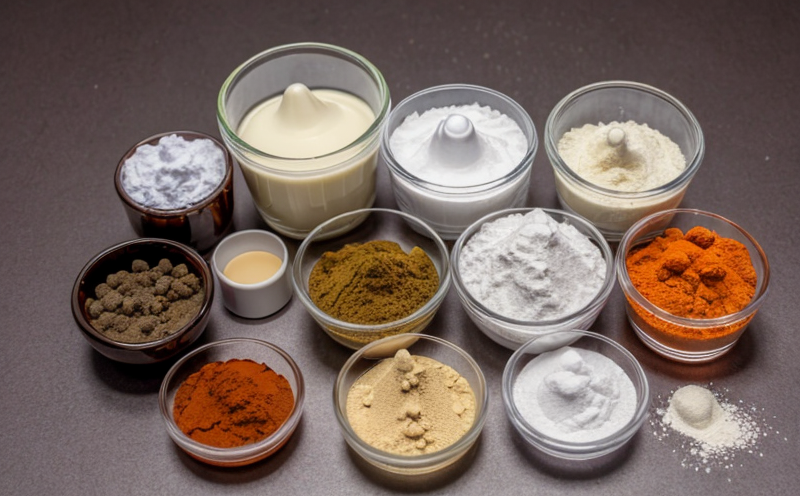Suspension Slurry Stability Testing
In pharmaceutical testing, excipients and formulation ingredients play a critical role in ensuring product stability, safety, and efficacy. Suspension slurry stability testing is one of the key services offered to ensure that drug formulations maintain their physical properties over time under various storage conditions.
The primary objective of suspension slurry stability testing is to evaluate how well an excipient or formulation ingredient behaves when suspended in a liquid medium. This test is particularly important for ensuring that suspensions remain stable and do not settle, separate, or degrade over time. The stability of such formulations can significantly impact the shelf life and performance of pharmaceutical products.
The testing process involves preparing a suspension slurry using the specified excipient or formulation ingredient in a defined liquid medium. This slurry is then subjected to various environmental conditions that simulate real-world storage scenarios, including temperature extremes (e.g., 4°C for refrigerated storage and 25°C for room temperature storage), humidity variations, and light exposure.
The stability of the suspension slurry is assessed through a series of analytical techniques. These include visual inspection to observe any sedimentation or separation, rheological testing to measure changes in viscosity over time, particle size analysis to ensure that particles do not grow or shrink excessively, and differential scanning calorimetry (DSC) to monitor any thermal transitions.
Understanding the stability of suspension slurries is essential for ensuring product quality. For instance, if a formulation ingredient separates when stored at higher temperatures, it could lead to inconsistent dosing, which might compromise patient safety or efficacy. Similarly, changes in particle size distribution can affect drug solubility and dissolution rate, both critical factors in pharmaceutical development.
Pharmaceutical companies rely on rigorous testing protocols like suspension slurry stability testing to meet regulatory standards such as those set by the United States Food and Drug Administration (FDA) and the European Medicines Agency (EMA). These organizations require that drug formulations demonstrate consistent performance across different storage conditions before being approved for market release.
By incorporating this test into their quality assurance processes, pharmaceutical manufacturers can proactively identify potential issues with formulation ingredients early in the development process. This allows them to make necessary adjustments before commencing large-scale production or clinical trials, thereby reducing costly rework and delays.
In summary, suspension slurry stability testing is a vital component of ensuring product quality and regulatory compliance in pharmaceutical manufacturing. It provides valuable insights into how excipients and formulation ingredients behave under various environmental conditions, helping to maintain consistent performance throughout the lifecycle of a drug product.
Benefits
- Enhanced Product Stability: Ensures that formulations remain stable over time and do not degrade under typical storage conditions.
- Informed Decision-Making: Provides crucial data for optimizing formulation design and selecting appropriate excipients.
- Regulatory Compliance: Meets the stringent requirements set by regulatory bodies like FDA and EMA.
- Patient Safety: Ensures that formulations do not compromise patient safety due to inconsistencies or degradations in performance.
- Cost Efficiency: Reduces potential for product recalls and rework by identifying issues early in the development process.
- Achieving Consistent Quality: Ensures that formulations meet high-quality standards, leading to more reliable products.
Why Choose This Test
Suspension slurry stability testing is an essential service for pharmaceutical companies looking to ensure the highest standards of product quality and regulatory compliance. By choosing this test, organizations can gain valuable insights into how their formulations behave under various environmental conditions.
The test helps in identifying any potential issues early on, allowing for timely adjustments to be made before large-scale production or clinical trials begin. This proactive approach not only enhances the overall quality of the final product but also minimizes risks associated with suboptimal formulations.
Moreover, suspension slurry stability testing aligns perfectly with current Good Manufacturing Practices (cGMP) guidelines and international standards such as ISO, ASTM, EN, and IEC. Adhering to these standards ensures that the company remains at the forefront of industry best practices, fostering trust among stakeholders.
By investing in this service, pharmaceutical manufacturers can demonstrate their commitment to delivering high-quality products that meet or exceed regulatory requirements. This commitment ultimately translates into enhanced reputation and increased customer confidence, which are crucial elements for long-term success in the competitive pharmaceutical market.
Environmental and Sustainability Contributions
Suspension slurry stability testing plays a pivotal role in supporting environmental sustainability within the pharmaceutical industry. By ensuring that formulations remain stable over time, this test helps minimize waste generation and resource consumption associated with product recalls or rework due to quality issues.
Stable formulations not only enhance patient safety but also contribute positively to the environment by reducing the need for additional manufacturing steps. This efficiency in production processes translates into lower energy consumption, reduced carbon footprints, and overall minimized environmental impact.
The use of rigorous testing protocols like suspension slurry stability ensures that only high-quality formulations reach market release stages. This reduces the likelihood of products being withdrawn from circulation due to inadequate performance, further promoting sustainable practices within the industry.
Pharmaceutical companies committed to environmental stewardship recognize the importance of such tests in their overall sustainability strategies. By integrating these assessments into routine quality assurance processes, they contribute significantly towards creating a more responsible and eco-friendly pharmaceutical sector.





